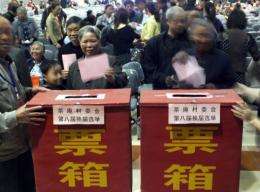China's local election candidates campaign online

When Yao Bo announced online that he was running in China's local elections, he joined dozens of candidates using the Internet to campaign for votes -- a phenomenon that has spooked authorities.
With more than half a billion Chinese now online, independent candidates are for the first time able to get their message to a broad audience of voters -- the reason Yao says he decided to run for elections.
But the 39-year-old writer, who is standing for election to the local people's congress in the Beijing district of Changping on November 8, admits that he is scared.
Others like him have been detained and threatened, and rights groups say the government fears a surge in independent candidates for one of China's only forms of direct election.
"It's not possible for me to say I'm not afraid, I am," said Yao. "But so far I haven't had any (trouble), maybe because I'm low key."
Local people's congresses are mandated to supervise the government, but until recently, few in China paid much attention to the five-yearly elections, which observers say are largely symbolic.
Most candidates are chosen by the government or Communist Party officials and while independents can take part if they have the backing of 10 people or more, few have won or even been allowed to stand.
This year, however, they have jumped into the spotlight after candidates used the web, and in particular the weibos -- microblogging services similar to Twitter -- to publicise their campaigns.
Some 140 independent candidates have decided to stand, according to the World and China Institute -- a non-government, non-profit research organisation composed of scholars and policy analysts.
Increasing numbers of people are seen as keen to play an active role in China's developing citizens' movement.
David Bandurski, a Hong Kong-based researcher at the China Media Project, said contenders have been able to campaign to "broader national audiences of more engaged and politically literate journalists, intellectuals and citizens".
Yao, who has more than 300,000 followers on weibo, says he decided to stand for election because of the multiple means of getting his message across.
"This year is different to other years in that mass information is more developed and methods of communication are much quicker, (so) your voice can't be crushed," he said.
"Anyone can communicate on-the-spot at any time, so the risks tied to standing for election are hugely diminished."
So far this year though, only two independents are known to have won local elections, which take place at different times in different areas.
Guo Huojia -- from the southern city of Foshan -- is one such winner. He was unwilling to speak when contacted by AFP but his lawyer, Liu Xiaoyuan, confirmed his win.
"The government is of course not happy about independent candidates, because many of them are petitioners and rights protectors," Liu said.
Petitioning is China's official system for hearing its citizens' grievances over injustices or unresolved disputes such as illegal land grabs or police misconduct.
Liu said it was harder for authorities to arrest trouble-makers once they became local representatives, and independents often raised sensitive issues if they attended the annual national parliamentary meeting.
This year has seen a broad range of people standing as independent candidates.
Li Chengpeng, a celebrity blogger and author from the southwestern city of Chengdu, announced his candidacy on his weibo account, which has garnered more than 3.7 million followers.
He told AFP he still had no idea when the election would be held, but refused to comment further, hinting at pressure from authorities.
Liu Ping, meanwhile, is on the other end of the scale. A retired worker from Xinyu in the eastern province of Jiangxi, she saw her local election come and go in June without being allowed to register.
Since then, she says, her phone is monitored and the service sometimes cut off and she has been detained, threatened and accused of mixing with "overseas anti-China people".
Asked about the harassment of independent candidates, foreign ministry spokesman Liu Weimin said citizens' rights were "protected by China's constitution and laws".
Wang Songlian, a researcher at the Chinese Human Rights Defenders group, said the party fears this form of "people's power" will grow out of control and threaten its monopoly on power.
But "because these elections are at such a low level of government and because of the way China's political system is structured, the participation of independent candidates is unlikely to bring democracy," she told AFP.
Still, Yao Bo -- who says he wants to push for better transport, more schools, kindergartens and hospitals if he is elected in Changping -- is hopeful.
"I think authorities will gradually accept this reality, that this right that citizens have cannot be brushed aside," he said.
"Change in China has often been initiated by ordinary people."
(c) 2011 AFP

















